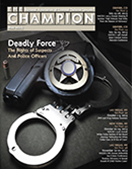May 2015

Should states enact new laws that better balance legitimate needs for police safety with the rights of citizens to be free from the unjustified use of deadly force?
Articles in this Issue
-
From the President: Questions, but Few Answers, Surround Police Body-Worn Cameras
NACDL formed a task force to study policy body-worn cameras and their related issues. How does one balance and address the public’s interest in seeing video footage recorded by police, a target or criminal defendant’s right to access the footage, and a subject or crime victim’s interest in maintaining privacy?
-
Law Enforcement Use Of Force: Safe and Effective Policing Requires Retention Of the Reasonable Belie
The deaths of unarmed suspects have led to claims of excessive police force and proposals for grand jury reform. North Carolina lawyer J. Michael McGuinness states, however, that people calling for reform are using emotion “to attempt to eradicate long-settled law that strikes a balance between the rights of police officers and suspects.” He adds that due to the proliferation of guns and the necessity of quick police action, some innocent members of the public will inevitably be killed or injured by the police, especially when they make gestures inferring that they are retrieving a weapon.
-
Lawful Use of Deadly Force by the Police: What’s Wrong in Ferguson and Elsewhere
In light of the killing of Michael Brown in Ferguson, Mo., should “use of deadly force to arrest” laws be changed? The authors recommend that state statutes be amended to employ an “objective necessity” test in cases involving “deadly force” arrests. This proposed standard would empower grand juries and petit juries to determine if an officer committed a crime — regardless of the officer’s subjective belief that the use of deadly force was necessary.
-
McFadden v. United States: Deconstructing Synthetic Drug Prosecutions
A jury convicted Stephen McFadden under the Analogue Act for selling “bath salts.” When ingested, bath salts can produce sensations similar to cocaine and methamphetamine. McFadden regularly checked the government’s list of banned substances and determined that his were not on the list. When a substances he was selling made the list, McFadden would stop selling it. In order to convict an individual of distribution of a controlled substance analogue, must the government prove that the individual “knew” that the substance constituted a controlled substance analogue, or is it sufficient merely to prove that the individual distributed the substance with the intention that it be for human consumption? This question earned the attention of the U.S. Supreme Court, which heard oral argument on April 20, 2015. What mens rea is required for this type of prosecution? Will the justices supply direction to lower courts concerning jury instructions in controlled substance analogue cases?
-
Microscopic Hair Comparison Analysis Review Project: A Milestone in the Quest for Forensic Science
The results of the first phase of a project to review FBI microscopic hair analysis testimony and lab reports produced the staggering revelation that FBI examiner testimony in at least 90 percent of the trial transcripts analyzed contained erroneous statements. This development likely will serve as a milestone in the quest for forensic science reform.
-
NACDL News: Clemency Project 2014 Applauds Obama Administration’s Clemency Grants; Hopes Raised for
President Obama granted clemency to 22 individuals on March 31, including in cases in which clemency was supported by volunteer lawyers through Clemency Project 2014.
-
NACDL News: Hank Asbill Receives White Collar Criminal Defense Award
Stetson Law and NACDL presented defense attorney Hank Asbill with the 2015 White Collar Criminal Defense Award on March 14. Asbill received the award during NACDL’s White Collar Criminal Defense College at Stetson University College of Law in Gulfport, Fla.
-
NACDL News: Mass DEA Surveillance Program Exposes Moral Bankruptcy Of the ‘War on Drugs’
On April 8, USA Today reported that for more than 20 years, from 1992 to 2013, the U.S. Drug Enforcement Administration (DEA) harvested and secretly stored records of billions of Americans’ international phone calls “in a program that provided a blueprint for the far broader National Security Agency surveillance that followed.
-
NACDL News: NACDL Calls for an End to Mass Postal Surveillance Practices
On April 19, 2015, NACDL adopted an important new report, Mail Cover Surveillance: Problems and Recommendations, that evaluates the current state of mass U.S. Postal Service surveillance and information-sharing and makes important recommendations for reform.
-
NACDL News: NACDL Opposes Utah’s Death By Firing Squad Legislation
In March, NACDL strongly urged Utah Gov. Gary Herbert to veto House Bill 11, which amended Utah’s death penalty statute to reinstate executions by firing squad. Utah had abolished execution by firing squad in 2004, but on March 23, the governor approved the new legislation.
-
NACDL News: NACDL Participates In Bipartisan Summit
NACDL News: NACDL Participates In Bipartisan Summit NACDL NACDL News 2015 14 Cynthia W. Roseberry moderates a panel discussion at the March 26, 2015, Bipartisan Summit on Criminal Justice Reform in Washington, D.C. 2015 false
-
NACDL News: New Guidelines Set Forth Standards in Representing Children Facing Life Sentences
In March, the Campaign for the Fair Sentencing of Youth released the first-ever guidelines for representing children who face the country’s harshest penalty.
-
NACDL News: Supreme Court Rules Against Prosecuting Fisherman Under Post-Enron Anti-Shredding Law; P
The U.S. Supreme Court on Feb. 25 issued its opinion in Yates v. United States.
-
NACDL News: Symposium Examines How Digital Searches Impact Fourth Amendment
NACDL News: Symposium Examines How Digital Searches Impact Fourth Amendment NACDL NACDL News 2015 15 NACDL Executive Director Norman L. Reimer (right) interviews former Qwest Communications CEO Joseph P. Nacchio at the April 3, 2015, symposium entitled “The Fourth Amendment in the Digital Age.
-
NACDL News: Webcast Focuses on Grand Jury
NACDL President Theodore Simon speaks at NACDL’s March 31, 2015, webinar (available free on demand) entitled “Re-examining the Grand Jury: Prosecutors, Police, and Race.
